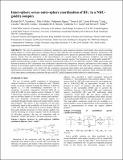Inner-sphere versus outer-sphere coordination of BF4- in a NHC-gold(I) complex
Abstract
The role of counterions in chemistry mediated by gold complexes stretches much further than merely providing charge balance to cationic gold species. Interplay between their basicities and coordination strengths influences interactions with both the gold center and substrates in catalysis. Actual monogold-(I) active species are generally believed to be monocoordinated species, formed from the abstraction or the decoordination of a second ligand from precursor complexes, but only a small amount of experimental evidence exists to underpin the existence of these transient species. The formation of a bench-stable neutral IPrCI-gold(I) tetrafluoroborate complex is reported herein. Experimental studies by X-ray diffraction analysis and NMR spectroscopy and theoretical studies by DFT calculations were conducted to determine the composition, structure, and behavior of this complex. The absence of an auxiliary ligand resulted in inner-sphere coordination of the counterion in the solid state. In solution, an equilibrium between two conformations was found with the counterion occupying inner-sphere and outer-sphere positions, respectively. Stoichiometric and catalytic reactivity studies with the tetrafluoroborate complex have been conducted. These confirmed the lability of the inner-sphere coordinating counterion that gives the IPrCI-gold(I) fragment behavior similar to that of related systems.
Citation
Veenboer , R M P , Collado , A , Dupuy , S , Lebl , T , Falivene , L , Cavallo , L , Cordes , D B , Slawin , A M Z , Cazin , C S J & Nolan , S P 2017 , ' Inner-sphere versus outer-sphere coordination of BF 4 - in a NHC-gold(I) complex ' , Organometallics , vol. 36 , no. 15 , pp. 2861-2869 . https://doi.org/10.1021/acs.organomet.7b00345
Publication
Organometallics
Status
Peer reviewed
ISSN
0276-7333Type
Journal article
Description
The European Research Council (ERC) and the Engineering and Physical Sciences Research Council (EPSRC) are gratefully acknowledged for their support.Collections
Items in the St Andrews Research Repository are protected by copyright, with all rights reserved, unless otherwise indicated.

